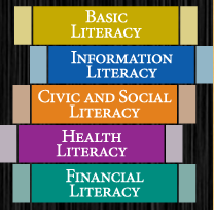Have you ever been presented with a great, but unexpected, opportunity to communicate the valuable contribution your library makes on campus or in the community? It can happen almost anywhere. These windows of opportunity are not only unexpected, but often very brief as well. Although some of us may be gifted communicators, able to thoughtfully articulate ourselves at the drop of a hat, most of us need to plan ahead in order to ensure that we get our message across effectively. That’s where crafting a so-called “elevator speech” comes in.
As the term implies, an “elevator speech” is a concise, effective statement that you can use in situations where time is of the essence. You can literally deliver it in the time it takes to ride the elevator up a few floors. A successful elevator speech will inform the listener of the valuable work of PA’s libraries, and also leave them curious to hear more. It’s obviously a good idea to have such a pitch handy and PA Forward has developed training to help you get started. In fact, PA Forward has developed training sessions that address a variety of topics, from building community partnerships, to best practices for teaching the five literacies, to developing your own elevator speech. Keep your eyes open for announcements via email and on the PaLA website. However, there’s no reason you have to wait until you attend a session to get started. You can get started right now! Kathy Silks, PA Forward Project Manager, has been kind enough to share the materials she uses for elevator speech workshops, and I’ll attempt to distill that information in the following paragraphs. But, before we get to the nitty-gritty, it’s important to point out something Kathy emphasizes in her training: Communicating our library’s value isn’t just a job for the director. Regardless of what position you hold, you can serve as a valuable ambassador for your library.
Now, let’s get to the speech itself. It’s a good idea to prepare a script for your speech. We’ve already defined what an elevator speech is and mentioned the goal of engendering curiosity in the listener. Things you might want to include in your speech are an introductory statement about the positive impact of PA libraries; your affiliation with a movement (such as PA Forward!); an essential role your library plays in the community; and a local example of how the library fulfils that role. Once you have a sentence addressing each of these points, you have enough content for your speech.
However, writing the script is only the first step. Now you have to practice it! Janis Stubbs, Assistant Director/District Consultant for the Delaware County Library System, points out that, while it may seem easy, it actually takes a lot of practice to get to the point where you can deliver your elevator speech in a way that sounds relaxed and natural.
In the end, the relatively brief investment of time required to nail down an effective elevator speech is well worth it just to know that you have a brief, thoughtful pitch ready should you need it. Kathy Silks, no stranger to elevator speeches, explains:
PA Forward is designed to change the way people think and talk about libraries and to help them understand and value the essential role libraries play in our communities. Having an elevator speech about your library prepares you to succinctly and effectively convey your library’s value whenever the opportunity arises.
If you’ve managed to put an interesting twist on your own elevator speech, or have a related story you’d like to share, I would be interested to hear from you! Just click on my name above to email me.
Need inspiration or some data to support your pitch? The PA Forward Toolkit includes a lot of information that can help.


